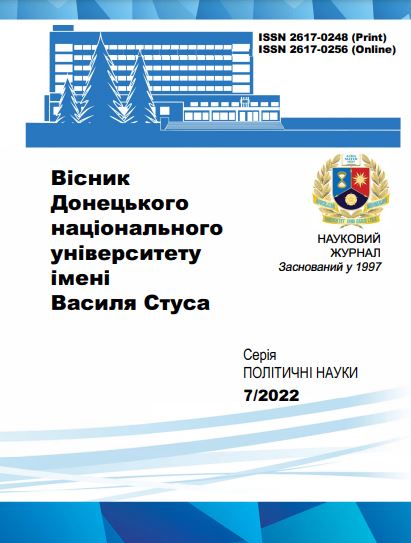Political space of the hungarian nation: the resource of kindred diasporas
DOI:
https://doi.org/10.31558/2617-0248.2022.7.9Keywords:
diasporas; national space; electoral space; Hungarian partiesAbstract
The article presents the process of reformatting the practices of national development through an expanded interpretation of the endogenous political space of the national community. It is noted that the EU spatial strategies have a significant impact on the revision of the priorities of regional development of modern states, which, seeking to ensure the sustainable development of their own political systems, turn to the socio-political capital of related foreign diasporas and border regions. In the context of the spatial revolution and the recognition of the actual political space as a constructed system, the nationalpolitical space acquires the characteristics of a flexible network system where new practices of national cohesion are formed, which are not limited by the sovereign borders of the state.
An example of the transformation of the process of national cohesion in Hungary is presented, which involves the incorporation of related foreign diasporas of Southern Slovakia, Transylvania, Vojvodina and Transcarpathia into a single socio-political system without revision of state borders. The socio-political development of Hungarian diasporas abroad is managed centrally through state institutions and programs. On the example of the creation of an extensive network of Hungarian political parties and NGOs within the socio-cultural spaces of the Hungarian diasporas, the process of building a system of autonomous projects along the perimeter of the borders of Hungary is shown, through which it seeks to modernize its own national doctrine by providing it with a transnational component.
Hungarian policy considers Hungarian communities as a resource that can provide a political transit for the national doctrine, which provides a modern component of the ethno-national idea, and makes it possible to respond to the spatial transformations of the EU.
References
Anderson M. Transfrontier Co-operation – History and Theory. Grenzüberschreitende Zusammenarbeit in Europa: Theorie – Empirie – Praxis / G. Brunn., P. Schmitt-Egner (Eds.). Baden-Baden: Nomos. P. 78–97.
Barth F. Ethnic Groups and Boundaries. The Social Organisation of Culture Difference / F. Barth (Ed.). London: George Allen & Unwin. 1969. Р. 9–38.
Hirschhausen von, B. The Heuristic Interest of the Concept of “Phantom Borders” in the Understanding of Cultural Regionalization. / M. Velguth (Trans.). L’Espace géographique. Paris: Balin. 2017. Vol. 46 (2) P. 106–125.
Gurr Т. R. Why Minorities Rebel: a Global Analysis of Communal Mobilization and Conflict since 1945. International Political Science Review. 1993. Vol.14. Is.2. P. 161–201.
Follis K. S. Building Fortress Europe. The Polish-Ukrainian Frontier. Philodelphia: Penn Press, 2012. 296 р.
Vekas J. Spectra: National and Ethnic Minorities of Hungary as Reflected by the Census. National and Ethnic Minorities in Hungary, 1920–2001. New York, 2005. P. 1–162.
Kontler L. Millennium in Central Europe. A History of Hungary. Budapest: Atlantisz Könyvkiado, 1999. 537 p.
Suli-Zakar I. The role of the Carpathian Euroregion in the CrossBorder Cooperations Operating Along the Borders of Hungary // Wurzburger Geographische Manuskripte. Wurzburg, 2003. № 63. P. 7-20.
A Szomszédos államokban élő magyarokról: Törvény LXII/2001. Nemzeti Jogszabálytár. 2001. URL: http://njt.hu/cgi_bin/njt_doc.cgi?docid=57066. 338598. (accessed 09.05.2021).
Határon túli magyarság a 21. században. URL: http://www. magyariskola.hu/letoltes/Htm_konyv.pdf (accessed 09.05.2022).
Erdelyi Magyar közművelődési egyesület (EMKE). URL: https://www.emke.ro/node/4. (accessed 09.05.2021).
Magyar Ifjúsági Tanács (MIT). URL: https://www.mitesek.net. (accessed 09.05.2021).
Erdélyi Magyar Nemzeti Tanács (EMNT). URL: http://emnt.org (accessed 09.05.2022).
Romániai Magyar Demokrata Szövetség. URL: http://www.udmr.ro (accessed 09.05.2022).
Bakk M., Szász A. Z., Székely I. G. Parlamenti és elnökválasztás Romániában 2004 novemberében. Magyar Kisebbség. 2004. 34 (9) sz. P. 3–52.
Erdélyi Magyar Néppár (EMNP). URL: http://www.neppart.eu
Magyar Ifjak Nemzeti Tanácsa (MINTA). URL: https://magyarifjak.hu (accessed 09.05.2021).
Magyar Polgári Párt (MPP). URL: http://www.polgaripart.ro/hu/ (accessed 09.05.2021).
A Magyar Polgári Párt 15 polgármesteri tisztséget szerzett. ALFAHÍR. 06.06.2016. URL: https://alfahir.hu/a_magyar_polgari_part_15_polgarmesteri_ tisztseget_szerzett (accessed 09.05.2022).
Политические партии венгров Румынии потребовали автономии для Трансильвании. Парламентарии также считают, что венгерский язык должен быть равным по статусу румынскому. Информационное агентство ТАСС. 09.01.2018. URL: https://tass.ru/mezhdunarodnaya-panorama/4861180 (дата звернення 05.08.2022).
Максимець В. Є. Становище національних меншин в Словаччині після вступу в ЄС. Слов’янський вісник: збірник наукових праць. Серія «Історичні та політичні науки». Рівне: РІС КСУ. 2013. Вип. 15. С. 112–115.
Strana maďarskej komunity (SMK): Stanovy dne 22.09.2012. Úplné znenie vypracované ku dňu 24.02.2018. URL: https://www.mkp.sk/sk/2012/12/09/stanovy-smk (дата звернення 05.11.2018).
The Impact of Decentralization on Social Policy / K. Tausz (Ed.). Budapest: Local Government and Public Service Reform Initiative, OSI, 2002. 312 р.
Most-Híd. Občianska Strana. URL: https://www.most-hid.sk/sk/o-strane (accessed 09.05.2021).
Savez vojvođanskih Mađara. URL: www.vmsz.org.rs (accessed 09.05.2021).
Национални савет мађарске националне мањине. Србија. URL: http://www.mnt.org.rs/sr (дата звернення 05.11.2018).
Kárpátaljai Magyar Kulturális Szövetség. URL: https://kmksz.com.ua (дата звернення 11.10.2018).
КМКС – Партія угорців України; Демократична партія угорців України – Відомості щодо зареєстрованих у встановленому законом порядку політичних партій станом на 18.01.2017 р. Департамент Державної Реєстрації та Нотаріату. URL: http://ddr.minjust.gov.ua/uk/ ca9c78cf6b6ee6db5c05f0604acdbdec/politychni_partiyi / (дата звернення 05.05.2022).
Тужанський Д. Як українські угорці допомогли Орбану зберегти абсолютну владу в Угорщині. LB.ua. 13.04.2018. URL: https://lb.ua/world/2018/04/13/395148_ukrainskie_vengri_pomogli_orbanu.html (дата звернення 04.09.2022).
Київ вимагає роз’яснень у Будапешта через створення посади уповноваженого по Закарпаттю. Європейська правда. 02.08.2018. URL: https://www.eurointegration.com.ua/news/2018/08/2/7085124/ (дата звернення 11.08.2022).
Захист угорського населення: Будапешт готовий підтримувати автономії в сусідніх країнах. Сьогодні. 26.03.2017. URL: https://ukr.segodnya.ua/world/zashchita-vengerskogo-naseleniya-budapesht-gotovpodderzhivat-avtonomii-v-sosednih-stranah-1006844.html (дата звернення 05.05.2022).

